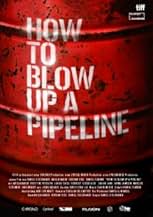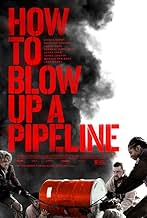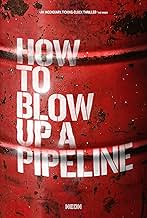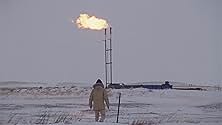AVALIAÇÃO DA IMDb
6,9/10
12 mil
SUA AVALIAÇÃO
Uma equipe de ativistas ambientais executa um plano ousado para destruir um oleoduto.Uma equipe de ativistas ambientais executa um plano ousado para destruir um oleoduto.Uma equipe de ativistas ambientais executa um plano ousado para destruir um oleoduto.
- Direção
- Roteiristas
- Artistas
- Prêmios
- 5 vitórias e 16 indicações no total
Avaliações em destaque
When I read about "How to Blow Up a Pipeline", I just had to see this movie. It is a timely political thriller that follows a group of eco-saboteurs who target an oil pipeline. Led by Xochitl, played by Ariela Barer, the group includes a diverse mix of characters, each with their own reasons for taking drastic action against the things that are killing the planet. The movie intercuts between their operation in Texas and flashbacks that reveal each character's motivations. We follow the group's nerve-wracking operation in Texas, where they check out their target, rig up explosives, and then set about doing the deed. Despite its political leanings, the movie doesn't preach or glamorize its characters, and the actors deliver strong performances that bring the characters to life. A very enjoyable movie to watch.
Recently, when a bunch of "Just Stop Oil" activists disturbed a World Snooker Championship game and, as per Gen-Z-climate-activist tradition, threw food all over the tables and sat themselves down in their anti-oil garments, a Twitter user quipped: "These types of climate protests are so detrimental to raising actual awareness and widespread support that if it ever came out that these people were paid for by gas and coal-owning billionaires I'd probably believe it".
Now, I don't know if the companies behind the well-made but questionable How to Blow Up a Pipeline have any such dubious ties (neither the production companies nor the distributor, Neon, have any deals with Big Oil that I could find). But man, what a time to do a psyop to make the enemy look deranged when said enemy will agree with the assessment and be proud of it!
Here is a movie loosely based on a book -- whose name-similarity to some kinda Dark Web instruction manual isn't accidental -- that speaks straight-out about how violence is a necessity for "climate justice"; essentially how destruction is correct so long as it's (purportedly) in the name of the right cause. I guess I shouldn't be too shocked. It was racism in 2020, it's climate change now; I just thought it was gonna be less mask-off terror apologia and more trying to rationalize throwing soup at art to make fossil fuels go away.
Then again, the book predates all those incidents and this manner of disruption was fairly commonplace in Sweden, the author's homeland, before the big vandalism stories of recent UK and US news. Perhaps the real surprise is that it came out after the Nord Stream incident -- an as-yet-unresolved case (of POSSIBLE eco-terrorism) that damaged decidedly more than "replaceable property" (what many radicals will tell you is the only real victim, even on a bad day). Not that this ever really stopped at "property", especially among the new wave of post-Thunberg soup Zoomers.
I sometimes ask: If, for example, a patient dies inside an ambulance as a result of road-blocking climate protestors -- as has literally happened in, you guessed it, Sweden a few months ago -- is that person deemed a necessary sacrifice for the utopia? After all, what's one death vs. The doomsday you've been told you're preventing? Do you redirect the trolley to kill one human when there are 8 billion hypothetical humans on the other track?
I accuse people of pussyfooting around this query, but I realize they've been answering me through actions for some time. When activists were convicted for the incident in Sweden, there were additional manifestations -- not in the name of the person that died, but the ones that got arrested.
Will a film like this exacerbate things? Hopefully not. It's being praised by the Usual Journalists for portraying the "terrorists" (sometimes in quotes, sometimes not) in a sympathetic light, but I didn't read them as outright unblemished. Someone will go "This was my Joker" but someone always does.
Now, I don't know if the companies behind the well-made but questionable How to Blow Up a Pipeline have any such dubious ties (neither the production companies nor the distributor, Neon, have any deals with Big Oil that I could find). But man, what a time to do a psyop to make the enemy look deranged when said enemy will agree with the assessment and be proud of it!
Here is a movie loosely based on a book -- whose name-similarity to some kinda Dark Web instruction manual isn't accidental -- that speaks straight-out about how violence is a necessity for "climate justice"; essentially how destruction is correct so long as it's (purportedly) in the name of the right cause. I guess I shouldn't be too shocked. It was racism in 2020, it's climate change now; I just thought it was gonna be less mask-off terror apologia and more trying to rationalize throwing soup at art to make fossil fuels go away.
Then again, the book predates all those incidents and this manner of disruption was fairly commonplace in Sweden, the author's homeland, before the big vandalism stories of recent UK and US news. Perhaps the real surprise is that it came out after the Nord Stream incident -- an as-yet-unresolved case (of POSSIBLE eco-terrorism) that damaged decidedly more than "replaceable property" (what many radicals will tell you is the only real victim, even on a bad day). Not that this ever really stopped at "property", especially among the new wave of post-Thunberg soup Zoomers.
I sometimes ask: If, for example, a patient dies inside an ambulance as a result of road-blocking climate protestors -- as has literally happened in, you guessed it, Sweden a few months ago -- is that person deemed a necessary sacrifice for the utopia? After all, what's one death vs. The doomsday you've been told you're preventing? Do you redirect the trolley to kill one human when there are 8 billion hypothetical humans on the other track?
I accuse people of pussyfooting around this query, but I realize they've been answering me through actions for some time. When activists were convicted for the incident in Sweden, there were additional manifestations -- not in the name of the person that died, but the ones that got arrested.
Will a film like this exacerbate things? Hopefully not. It's being praised by the Usual Journalists for portraying the "terrorists" (sometimes in quotes, sometimes not) in a sympathetic light, but I didn't read them as outright unblemished. Someone will go "This was my Joker" but someone always does.
I did enjoy 'How to Blow Up a Pipeline', but I couldn't help but want to rewatch 'The East' (dir Batmanglij, 2013), which had a similar structure (re denouement), but the stakes seemed higher in 'The East', and the psychology of the characters were a lot more deep and varied. I think that was because you come at 'The East' from the point of view of an outsider, and you watch her character arc alongside that of the eco-terrorists, and see how interacting with them changes her (and changes you, as a viewer, too).
But, even so, I'm very glad I did watch 'How to Blow Up a Pipeline', and the film made me want to read the source material.
But, even so, I'm very glad I did watch 'How to Blow Up a Pipeline', and the film made me want to read the source material.
Do the ends truly justify the means? That's an age-old question that has been asked countless times in countless contexts, but what's the answer? That's a decision left open for viewers to ponder in this taut ecothriller about a group of zealous environmental activists who plan to blow up a west Texas pipeline in an effort to draw attention to such issues as global climate change and public health considerations. Writer-director Daniel Goldhaber's second feature skillfully combines elements of various cinematic genres, including Westerns, heist films, political thrillers and ecological dramas like "The East" (2013), but it does so in some highly unexpected ways. In particular, this well-constructed, smartly produced offering is heavily character-driven, presenting genuinely compelling back stories about its crew of protagonists told through a series of strategically placed flashbacks. What's more, the picture's gorgeous cinematography, superb editing, fine performances and intense original score all lend themselves to a splendidly crafted package, certainly much more than what one would typically expect out of a low-budget indie. Of course, these strengths aside, this still leaves open the question about the impact of this story. What kind of message does it send? Is it appropriate to make and release a picture that depicts such a subversive venture such as this? Can the kind of collateral damage at stake here be justified, be it even theoretically told through a work of fiction? But, then, can society continue to willfully ignore the kinds of environmental damage that are being allowed to unfold without taking any meaningful action? And what of the law enforcement questions involved in a scenario like this? "Pipeline" gives viewers ample food for thought while simultaneously reminding us that the clock is ticking on these issues - and that we had better start making some serious decisions soon.
It may not have the most appealing title and there's a conspicuous lack of 'stars' but this independently made 'eco-thriller' may be the best thriller you will see this year. Basically you could say it does what it says on the tin as a group of 'eco-warriors', (good performances from a largely unknown cast), set out to sabotage the pipeline of the title. Think of it as a heist performed by eager, well-intentioned amateurs but with the pipeline standing in for the bank vault while director Daniel Goldhaber displays the same ability as the young John Sayles for eliciting first-rate work from his fresh young cast and for giving the film the feel of a documentary.
It's also genuinely exciting; for starters these guys are dealing with high explosives that could go off at any time with deadly results and secondly, whether or not you agree with their agenda, they remain a sundry bunch of criminals packing weapons and perhaps capable of anything. A neat ending, too, that isn't as predictable as you might think. All in all, one worth seeking out.
It's also genuinely exciting; for starters these guys are dealing with high explosives that could go off at any time with deadly results and secondly, whether or not you agree with their agenda, they remain a sundry bunch of criminals packing weapons and perhaps capable of anything. A neat ending, too, that isn't as predictable as you might think. All in all, one worth seeking out.
Você sabia?
- CuriosidadesMalm's book (How to Blow Up a Pipeline) is a work of nonfiction that uses a history of social justice movements to argue that property destruction should be considered a valid tactic in the pursuit of environmental justice.
- ConexõesFeatures Spy x Family (2022)
- Trilhas sonorasChamomile
Written, Performed, and Produced by Cameron Burt (as Winslow Leach)
Principais escolhas
Faça login para avaliar e ver a lista de recomendações personalizadas
- How long is How to Blow Up a Pipeline?Fornecido pela Alexa
Detalhes
- Data de lançamento
- País de origem
- Central de atendimento oficial
- Idioma
- Também conhecido como
- How to Blow Up A Pipeline
- Locações de filme
- Empresas de produção
- Consulte mais créditos da empresa na IMDbPro
Bilheteria
- Faturamento bruto nos EUA e Canadá
- US$ 750.010
- Fim de semana de estreia nos EUA e Canadá
- US$ 115.453
- 9 de abr. de 2023
- Faturamento bruto mundial
- US$ 1.046.811
- Tempo de duração1 hora 44 minutos
- Cor
- Proporção
- 1.78 : 1
Contribua para esta página
Sugerir uma alteração ou adicionar conteúdo ausente

Principal brecha
What is the Hindi language plot outline for How to Blow Up a Pipeline (2022)?
Responda






































